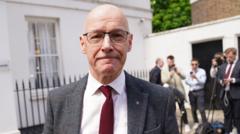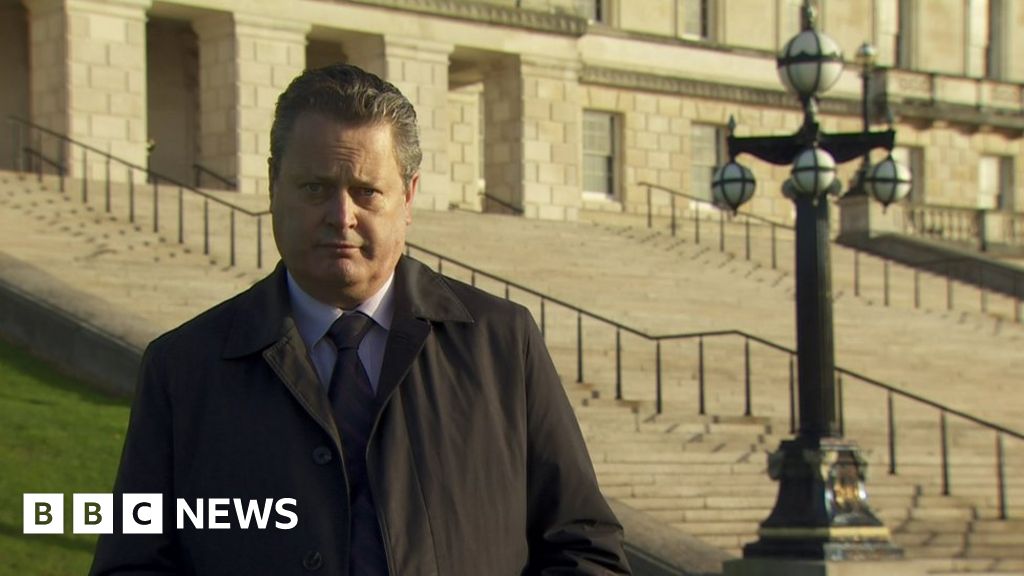Rishi Sunak is unveiling a major crackdown on Britain's 'sick note culture' today as he warns normal 'life worries' are not a reason to stay out of the workforce.
The PM is using a speech this morning to lay out plans for specialist teams to assess what work people can do, rather than GPs signing them off.
He highlighted that 850,000 more are long-term sick than before the pandemic, arguing that it is time to be 'more honest about the risk of over-medicalising the everyday challenges and worries of life'.
Mr Sunak said he would not 'let down' Brits by refusing to tackle the issue for fear of 'causing offence'.
'The situation as it is is economically unsustainable,' he said. 'We can't afford such a spiralling increase in the welfare bill.'
The intervention comes after figures released this week revealed that the number of people considered 'economically inactive' after being placed on long term sickness benefits has jumped by a third since the start of the pandemic and now stands at a staggering 2.8million.
In a major speech today, Rishi Sunak will warn that a surge in people signed off sick with mental health conditions is placing 'unsustainable' pressure on the welfare budget
Around half are signed off with depression, anxiety and bad nerves.
Overall, 9.4 million people aged between 16 and 64 are economically inactive - meaning they are neither in work nor looking for work.
The PM highlighted figures showing that GPs issue so-called 'fit notes' to 94 per cent of those who ask for them, with more than 11million doled out last year.
He said it could be time to end the role of GPs in the system.
Questions have been raised over whether surgeries need the added workload amid a long backlog of patients in the wake of the pandemic.
In future, those looking to be signed off could be asked to discuss their health with teams of 'specialist work and health professionals' who will assess what work they can do and what help they need to 'bounce back to the workplace'.
Mr Sunak said: 'For me, it is a fundamental duty of Government to make sure that hard work is always rewarded.
'I know, and you know, that you don't get anything in life without hard work.
'It's the only way to build a better life for ourselves and our family, and the only way to build a more prosperous country.'
He said since the pandemic 'something has gone wrong'.
The plans face questions over whether people without medical qualifications are well-placed to make decisions about someone's ability to work.
But Work and Pensions Secretary Mel Stride told LBC Radio there was no alternative to reform. 'If you look at issues like long-term sickness, disability, and you add up all the costs of all the benefits there, you get to about £69billion,' he said.
'The most worrying aspect of all of this… is the increased cost going forward. So all the forecasts are for these benefits to be skyrocketing upwards in time. And that is something that we must address. Enough is enough on that one is my message.
'So what you will be hearing from the Prime Minister is that we will be taking measures to make sure that welfare spend is under control.'
Mr Stride said higher spending on welfare is 'adding to the pressures for people to be paying, for example, more taxation'.
He acknowledged that the details of the new system were yet to be finalised, but argued that in many cases it would just mean 'different configuration of existing resources'.
He added: 'We have already gone out to the various health boards around the country and we have 15 of the 42 in England who in the autumn will be participating in something called WorkWell, which is the name for what I described earlier of bringing together the medical assistance but also that critical work-based advice and support as well.'
In a round of interviews ahead of the speech, Work and Pensions Secretary Mel Stride said 'enough is enough' - pointing to 'skyrocketing' benefits spending
Mr Stride said a call for evidence launched on Friday will help determine 'exactly what the model is and exactly how it will work,' but broadly, a GP would send a patient with a bad back to WorkWell, where an advisor may contact their workplace to make adjustments such as relocating their office to the ground floor.
In his speech, Mr Sunak said: 'We don't just need to change the sick note, we need to change the sick note culture so the default becomes what work you can do – not what you can't.
'Building on the pilots we've already started we're going to design a new system where people have easy and rapid access to specialised work and health support to help them back to work from the very first fit note conversation.
'We're also going to test shifting the responsibility for assessment from GPs and giving it to specialist work and health professionals who have the dedicated time to provide an objective assessment of someone's ability to work and the tailored support they need to do so.'
The PM said there is a 'growing body of evidence that good work can actually improve mental and physical health'.
He added: 'We need to be more ambitious about helping people back to work and more honest about the risk of over-medicalising the everyday challenges and worries of life.'
The change is part of a wider package of welfare reforms being drawn up by Mr Stride amid concerns about the soaring benefits bill.
He has raised concerns the NHS is not doing enough to keep people in work, with his department now taking steps towards creating a national occupational health service.
Pilot schemes are under way offering job coaches, physiotherapy and mental health treatment to people at risk of dropping out of the workforce.
Since the pandemic, total spending on working age disability and ill-health benefits has increased by almost two-thirds to £69 billion (Stock Image)
Mr Sunak welcomed the fact that people feel able to 'talk openly about mental health conditions in a way that only a few years ago would have been unthinkable'.
But, he said 'just as it would be wrong to dismiss this growing trend, so it would be wrong merely to sit back and accept it because it's too hard; or too controversial; or for fear of causing offence'.
'Doing so, would let down many of the people our welfare system was designed to help,' he said.
Labour, as well as the Tories, has also called for the trend to be addressed.
Professor Kamila Hawthorne, Chair of the Royal College of GPs, said: 'The college is supportive of a consultation to understand who is best placed to issue fit notes, given the workforce and workload pressures already faced by GPs.
'It is vital that if others become involved in this process that the best interests of the patient remains the priority for anyone involved in assessing someone's ability to work.'
Chief executive of mental health charity Mind, Dr Sarah Hughes, said in her response to the news: 'We are deeply disappointed that the prime minister's speech continues a trend in recent rhetoric which conjures up the image of a 'mental health culture' that has 'gone too far'.
'This is harmful, inaccurate and contrary to the reality for people up and down the country. The truth is that mental health services are at breaking point following years of underinvestment, with many people getting increasingly unwell while they wait to receive support.'
She added: 'To imply that it is easy both to be signed off work and then to access benefits is deeply damaging. It is insulting to the 1.9 million people on a waiting list to get mental health support, and to the GPs whose expert judgment is being called into question.'

 1 week ago
1 week ago
.png)









